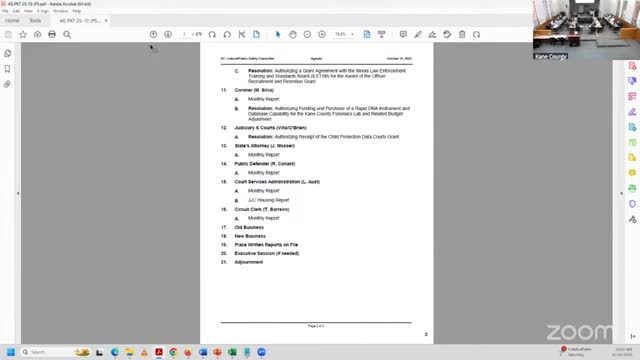State's Attorney says state law will let officers use discretion on juvenile domestic-battery arrests; local training planned
October 17, 2025 | Kane County, Illinois
This article was created by AI summarizing key points discussed. AI makes mistakes, so for full details and context, please refer to the video of the full meeting. Please report any errors so we can fix them. Report an error »

State's Attorney Mosser told the Kane County Judicial & Public Safety Committee on Oct. 16 that a change in state law (going into effect in November, per the state's implementation timeline discussed) will allow police officers to exercise discretion and avoid arresting juveniles for many forms of misdemeanor domestic battery. "We think this is very important," Mosser said, adding that the change is intended to reduce unnecessary juvenile entry into the justice system.
Mosser described four typical situations that the new guidance/typology is meant to address: single, one-off incidents (for example, sibling fights); family-chaos incidents tied to substance abuse or other household stressors; defensive acts by juveniles protecting others; and escalating behavior that requires intervention. She said officers will have an "adolescent domestic battery typology tool" to assess risk and history and determine whether arrest is required.
Mosser emphasized that the change is not intended to shield violent juveniles from accountability. "If this is something where strangulation is involved, if it's something where it's an attempt murder, those are not kids who are being deflected," she said. The state's attorney's office and other county agencies plan training on the new approach and will share best practices with law-enforcement partners across Illinois.
Ending: The committee welcomed the change and the planned training; members noted that the policy should not be interpreted as allowing violent offenses to go unprosecuted and asked for implementation details to be shared with local agencies and the public-safety committee.
Mosser described four typical situations that the new guidance/typology is meant to address: single, one-off incidents (for example, sibling fights); family-chaos incidents tied to substance abuse or other household stressors; defensive acts by juveniles protecting others; and escalating behavior that requires intervention. She said officers will have an "adolescent domestic battery typology tool" to assess risk and history and determine whether arrest is required.
Mosser emphasized that the change is not intended to shield violent juveniles from accountability. "If this is something where strangulation is involved, if it's something where it's an attempt murder, those are not kids who are being deflected," she said. The state's attorney's office and other county agencies plan training on the new approach and will share best practices with law-enforcement partners across Illinois.
Ending: The committee welcomed the change and the planned training; members noted that the policy should not be interpreted as allowing violent offenses to go unprosecuted and asked for implementation details to be shared with local agencies and the public-safety committee.
View full meeting
This article is based on a recent meeting—watch the full video and explore the complete transcript for deeper insights into the discussion.
View full meeting
